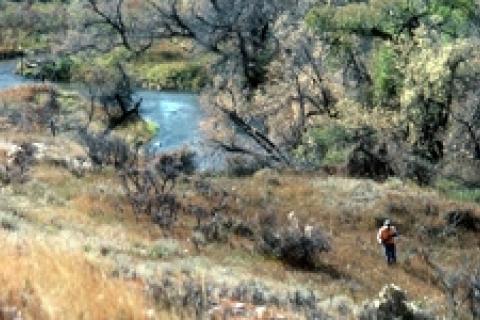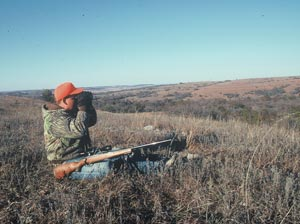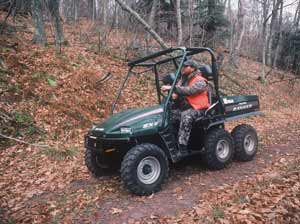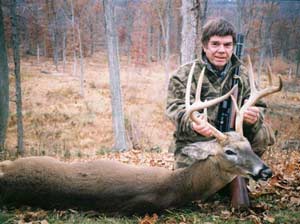
With the heavy pressure most public areas are subjected to, it's a rare sportsman who hasn't thought of buying his own hunting land. If you own the land you can manage the deer how you like; let young bucks walk; plant food plots; and enjoy the property the rest of the year for hiking, camping, fishing, small game hunting and family excursions.
 No need to worry about someone else beating you to your chosen stand site or sauntering through the area just when you hoped a big buck might show. Even if you have permission to hunt on another person's private land, that could vanish instantly if someone else offers thousands of dollars to lease it or a developer buys it. If you own the land, though, no one can interfere with your hunting.
No need to worry about someone else beating you to your chosen stand site or sauntering through the area just when you hoped a big buck might show. Even if you have permission to hunt on another person's private land, that could vanish instantly if someone else offers thousands of dollars to lease it or a developer buys it. If you own the land, though, no one can interfere with your hunting.
I've purchased a number of different properties for hunting in both Virginia and Texas and each time found it a valuable and immensely rewarding experience. But I also learned that there are lots of things that need to be carefully considered before taking the plunge.
Let's look at some of the issues you should address before signing a contract to buy your own hunting land.
Some Issues to Address Before Buying Your Own Hunting Land
Ask Yourself...
|
|
| Owning land is a rewarding experience for the deer hunter, but make sure you ask yourself some key questions first. |
1. Are you ready? The answer to this relates to lots of issues, including employment, family and finances. Is your job stable enough that you'll likely be in the area where you plan to buy the land for at least a few years? Is your financial situation sound enough that you can afford either a cash deal or the mortgage payments?
Also ask yourself if you have enough free time to enjoy it. If you have a high pressure job with 60-hour work weeks, there's not much point owning a tract. You won't have time to enjoy it.
2. Can you cope with your investment value declining? Real estate, like stocks and bonds, can go up or down in value. If the cycle heads south, will it bother you to see the land value drop? The odds are the land's price will go up, but don't buy if you can't stomach a potential decline in value down the road.
3. Should you lease property instead of buying? This is a very important question. Do you really need to own the land? If you could control the hunting, decide which deer could be harvested, do improvements such as food plots and other habitat work, maybe a lease is a better bet.
The drawbacks are these: You could lose the lease to a higher bidder; you won't have an investment in an asset that could grow in value; and you won't have total control over the property.
4. How do surrounding landowners and hunters manage the deer? In other words, what is the local hunting situation like? If an area is intensely hunted with lots of pressure on young bucks, it may not be a good location. Talk with owners of small hunting stores in the area, sportsmen's groups and the regional wildlife biologist. This research takes time, but is vital.
 |
| Owning your own land lets you control the pressure and what ages of bucks are harvested. |
If you buy 100 acres surrounded by property owners who shoot any legal buck, your chances for holding older, trophy whitetails are slim. If possible, talk to landowners with property adjoining the tract. Are most of those surrounding parcels small or large? The bigger the neighbors' tracts are the better.
5. Does the area itself offer other attractions? Is there a good trout stream or bass lake nearby? If so you can camp or stay in a cabin on your property and enjoy those activities, while getting in some habitat work and scouting during the off-season. Is there good upland game or spring gobbler hunting on the property? What about a town nearby where you can get last-minute supplies?
6. Does the land offer good habitat upgrade prospects? For instance, are there places where a small creek drains or a low spot would be a good location to put in a pond? Check out whether the land has open areas where you could put in food plots without a lot of timber and brush clearing. Also look for places where some timber thinning or small, irregular-shaped clearcuts would improve the habitat or where you could plant a grove of pines for bedding cover.
7. Is there a nice mixture of topography and vegetation types? If possible, avoid buying a big tract of woods with no open areas such as fields or clearings. On the opposite extreme, you don't want a property with no trees or cover.
Areas with a variety of habitat — hills, draws, open land and mature timber, ridges, brushy cover and lots of different plant species — are best. They'll offer deer the variety of habitats they need for different times of year and a good mix of foods.
Mast-bearing red, white and chestnut oaks are a definite plus, as are fruit trees, berry bushes and small cutovers. If you find property with blackberry, raspberry, honeysuckle and greenbrier bushes, you've found a deer paradise. Clusters of evergreens are also valuable for thermal cover to keep deer on your land during cold winters.
If at all possible, buy a tract with a creek, river or pond. Any deer sign you can find such as tracks, old rubs or scrapes are obviously positives. Some jungle-like thick cover is good for holding big bucks. An area with linear strips of shrub-cover that could be a travel route from farm fields to rougher bedding cover is also a definite plus.
 |
| One of the perks to owning your own land is that you can restrict ATVs or use them yourself to get to remote areas. |
8. What's the prospect for finding (or growing) large bucks on the property? Check the state big game records awards programs, Pope and Young and Boone and Crockett record books to see if the county or adjoining ones have produced any large animals. State and regional "big buck" clubs can also tell you what type of antler scores can be expected on the best older bucks in a given area.
9. Are the specific features of the parcel attractive? Is there a cabin or small home that could be used as a hunting camp? If not, what are the building restrictions if you want to put one up at a later date? Is water available? How deep did the neighbors have to drill to get a working well?
10. What about permits, access and services? If you want to build in the future you'll have to be sure the land percolates or an alternative septic system is possible. What type of access is there? Is there a road that will hold up in wet weather and one that you can travel in snow? Does electricity come to the area or can it be brought in? How about telephone service?
11. Is the property the best one for your needs? Don't rush in and plop money down on the first or second parcel you find. Cruise back roads searching out "land for sale" signs. Study classifieds. Check with realtors. Pick up booklets. And most importantly, use the Internet.
The more tracts you scope out, the more you'll see how different parcels stack up against each other. When you find that special spot, you'll know it's the one.
How Much Hunting Land Do You Need?
If you are buying the property just to hunt by yourself with one or two friends or family members, 50-100 acres with some woods and brushy cover is enough land to enjoy a positive hunting experience on. (More, though, is always better.) For a group of four or five hunters, try to get a parcel of at least 200 acres, so you don't crowd each other and feel just as pressured as when you hunted on public land.
If you have close to a dozen in a hunting group, shoot for 700-1,000 acres. With that much property and some good habitat work to create sanctuaries, chances are you can keep most of the big bucks you raise on your land.
- 37834 views


